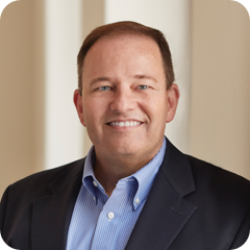
The company recently completed a funding round that raised an addition $5 million for its Series A funding round, bring the total raised in the last few months to $13.3 million. This Series A1 round was led by led by Avalon Ventures and Salesforce founder and CEO Marc Benioff. This interview was carried out prior to that being public.

ET: Who is your inspiration and why?
Wendell Brown: Henry Ford. Because he had to not only build his product, but he also had to build the ecosystem around it, specifically, the roads. You can build cars without roads, but until the roads are there, you can’t drive the cars.
ET: How would you describe your leadership style?
Wendell Brown: Distributed. Meaning that I only make the decisions that I need to make. Otherwise, I like to instil our executive team members to make decisions themselves.
ET: What are your personal challenges for the next twelve months?
Wendell Brown: Hiring. Our team is growing and growing quickly. Part of my personal challenge is to leverage, not just my own personal network, but all of our networks to hire the best additional team members we can.
ET: How do you differentiate yourself in attracting talent in the security market, which is especially tough at the moment?
Wendell Brown: We differentiate ourselves by solving a big, broad problem in the security market. It’s more than just a product, we’re really on a mission to solve the bigger problem. That gets people excited, and that can be helpful in hiring when there’s a big vision.
ET: What is that bigger problem?
Wendell Brown: The general problem with cyber security is that identification and authentication is not a core protocol. There’s http and then there was https, which is a security-level protocol, but there’s no identity standard. That’s one of the things we’re creating, and we’re working with other companies to create. We’re really setting this next identity protocol. We think that’ll solve a lot of the fundamental problems at the core.
ET: What was your darkest business day, and how did you overcome it?
Wendell Brown: At a prior company I had started, one of our management members had sent a very detailed email with everyone’s salary information and all kinds of private details, mistakenly sent it out to everybody in the company. Initially that was perceived to be quite a problem. Since everyone was being treated fairly, it was actually much less of a problem than it originally appeared to be. It turned out almost to be a good thing and blessing. But that was a dark moment initially.
ET: When you said you overcome it, the information was spread, you can’t put the rabbit back in the hat.
Wendell Brown: That’s right. I was the CEO. I held a company-wide meeting, explained what happened, and communicated what we had done. We tried to instil something in the email system so that mistake wouldn’t happen again. What was interesting to me is, and I think the take away was, you should always operate a company and treat people as if all this information would be out there anyway. So, it turned out that it was actually not nearly as big of a problem as some of our other people thought it would be. I think more in a spiritual sense. If you treat people fairly and the information did get out, it shouldn’t cause that much of a problem anyway, and fortunately we were in that good space.
ET: What was your proudest moment?
Wendell Brown: I would say my proudest moment was that I started a company that got acquired by Microsoft. A company called Teleo. Ever since I was a young kid, that was one of my dreams and I had always looked up to Microsoft.
ET: Can you share a tip for founder CEOs?
Wendell Brown: The tip I would give, and I’ve done this with multiple people, is to invest in team training. Probably more than people would imagine they should. For example, I’ve sent multiple sales teams to negotiating courses. A lot of people don’t necessarily have training or backgrounds in how to negotiate. Yet, that’s something that sales people in particular and a lot of us do without even realising it. My tip would be, look at what skills people really need, and invest in team training.
ET: What’s the latest business book you’ve read or your favourite book about cost?
Wendell Brown: Crossing a Chasm, Jeffrey Moore. I actually reread it recently. That book came out quite a while ago, maybe eight or 10 years ago. It’s an interesting book that describes the challenges of how to really move something from a fledging technology and how to move something into the mass larger consumer markets and the process of how to do that.
ET: What’s the worst and best decision you’ve made as a CEO?
Wendell Brown: The best decisions are around team and hiring people. It’s very common to hear that people are the most important resource, but especially to a start-up. It really, really matters who the team is. We’ve got a great team. I would say that my best decisions have been around choosing and attracting our team.
ET: It’s not necessarily about the bringing the best individuals into a team, is it though?
Wendell Brown: That’s a lot of it, but it’s also a team that can work together, of course, as well.
ET: And how do you find that out?
Wendell Brown: I don’t think there’s a perfect answer for that. When we interview, we have multiple of our team members interview potential new team members. Google and others do that as well of course, but we also hire in people that have successfully worked on teams before. There’s an African proverb:
“If you want to go fast, go alone. If you want to go far, go together.”
A lone runner can run fast for short distances generally, but then if you want a company to run far, you really need to have a dynamic of how ‘do we work as a team’. I think there’s an analogy there on managing a company as well.
ET: What is Wendell Brown’s ‘why’?
Wendell Brown: I’ll try to answer that both personally and then I’ll try to answer it on a more global scale. Personally, I just spend way too much time and I get way too frustrated as many people do just dealing with all the logins and authentications. It consumes way too much time in my day. It’s a problem that can be solved, should’ve been solved, and we’re solving it.
On a global basis, it’s this lack of an effective identity solution on the internet and the mobile internet that really needs to be solved to create trusted transactions, trusted markets, even trusted news. It’s fundamental to so much of what happens electronically around the world now, so it’s a problem that really needs to be solved at a global basis.
ET: What keeps you up at night?
Wendell Brown: I would say hiring and how we’re going to grow the team with high quality people.
ET: How do you approach the change of rapid growth while maintaining culture?
Wendell Brown: One of the things that we do as a company is regular off sites, probably more frequently than other companies. We have off sites now every one or two months. Usually every two months with the whole company. That is both a way of focused team time together for intensive communication, and it also has become part of our culture as well.
ET: How do you prioritise your week? What and how much time do you spend in different areas?
Wendell Brown: Very good question. I primarily base it on our quarterly and my personal weekly goals. We have quarterly key objectives and I break those down into weekly goals. Then my schedule decisions and my time decisions are driven off of those weekly goals.
ET: How do you deal with noise?
Wendell Brown: As best as I can. (chuckles) When managing a company, both at a management level, but also at a personal level, time management is really so important and I’ve taken training in time management, and I think that’s very important. I do try to consciously proactively delegate and involve other people in decisions, but that’s not always a perfect process of course.
ET: What are the key challenges faced currently by your industry?
Wendell Brown: In my view the key challenge is that cyber security is clearly not solved yet. That is partly because there’s a lack of a standard. That lack of a standard has in turn caused thousands of companies to recreate the same wheel, which in turn has created a shortage of skills in this area. By looking at this ecosystem in a broader picture, so many problems have been caused and are rooted by this lack of an effective standardised solution.
ET: What does your competitive threat landscape look like?
Wendell Brown: There are certainly quite a few companies in the cyber security space of course, and there’s quite a few in the identity space. Most of them are focused on what I would call band aid solutions. In other words, fixing a problem, fixing a symptom, but not fixing the root problem. The problem with that is what the industry has seen, is that there’s just symptom after symptom, after symptom. And it’s a losing battle to try to constantly keep fixing symptoms, but the real solution is to fix the fundamental problem.
ET: How are you persuading the buyers of those solutions to adopt? Until you have some of the larger security companies backing a new standard, it’s a very hard argument.
Wendell Brown: The short answer is that we’re starting to work with some of the bigger companies. A lot of people have recognised that the problem needs to be solved in a more fundamental way, and not just a symptom. I’ll give an example just to help clarify. A lot of security today is based on a piece of knowledge that the user keeps secret, right? It could be a password, sometimes, but the concept is often what the person knows, or has, or does. I think that’s a fundamentally flawed approach.
Today, it’s just too easy for people to store their passwords, or write down their passwords, or use passwords based on their personal backgrounds. With AI and databases, that information is just simply not secret for long. And that’s a fundamental problem. If you base security on a secret that somebody knows, it’s limited usefulness in today’s world where people can gain access to people’s backgrounds.
A question like, you know, what street did you grow up on when you were a child? With AI, that can be now determined, or guessed, or there could be bots that research that today. Those kinds of questions are just not anywhere as useful as they once were thought to be.
ET: What’s the one question you would like to ask another CEO to answer?
Wendell Brown: How do they manage their time.
ET: I don’t know if you’ve read Larry Fink’s 2018 letter about how companies should be making a contribution to society. Do you have a stand on that?
Wendell Brown: I think companies absolutely should make decisions based on improving the world, on what’s best for society. A corporation has, as one of its highest responsibilities, its shareholders. The classic end goal of the company is to maximise value for shareholders. Often that could be done in different ways, be conscious of the contribution and the impact to the world.
With some companies, that can be carbon footprint amounts. There’s a lot of ways that companies have impact on the world, but I do think companies should be operated with a social conscience, yes.
ET: And how is Averon doing that itself?
Wendell Brown: Part of our social benefits are by improving security that has societal impact of reduced crime, reduced cybercrime. By protecting and authenticating things like information sources, we can make a positive impact in reducing the fake news phenomena. Also, we could make, and I actually was going to calculate this and I haven’t done this yet, but to me a very straightforward impact is just simply how many billions of human hours we can save that are currently being wasted on poor security solutions.
ET: Thank you


























